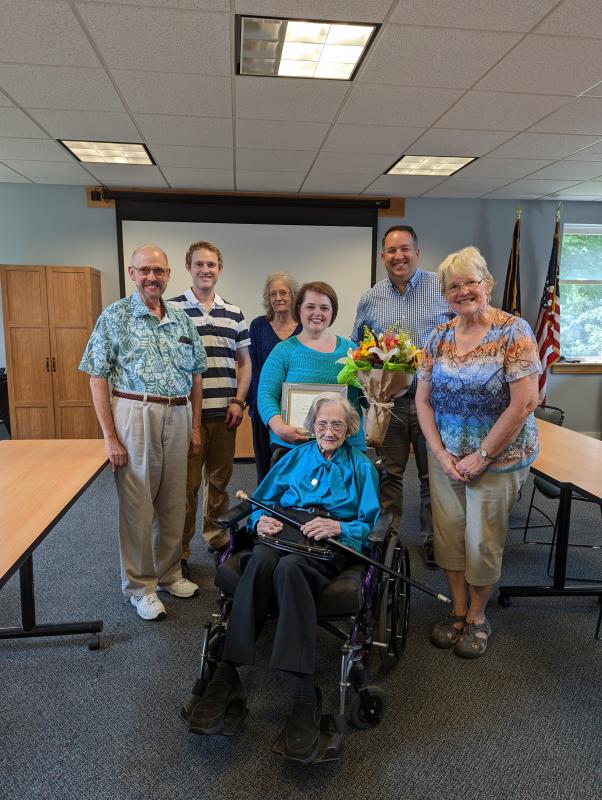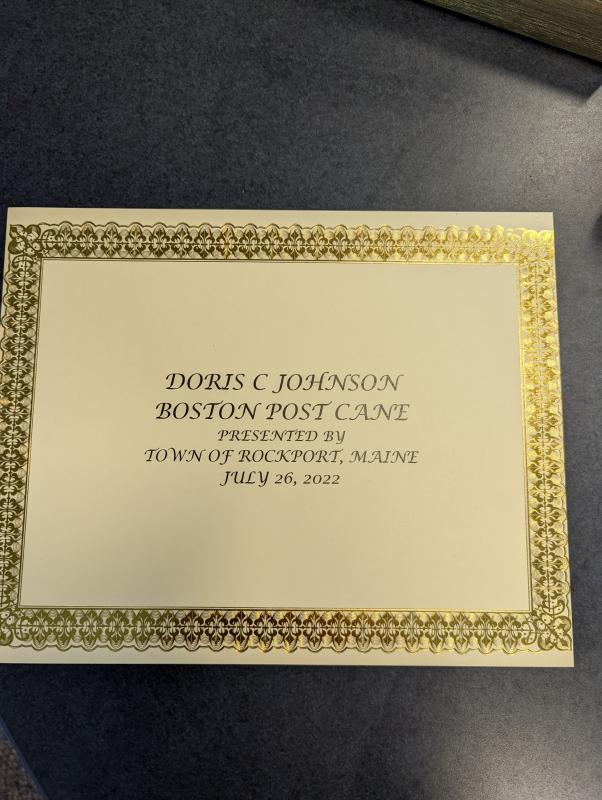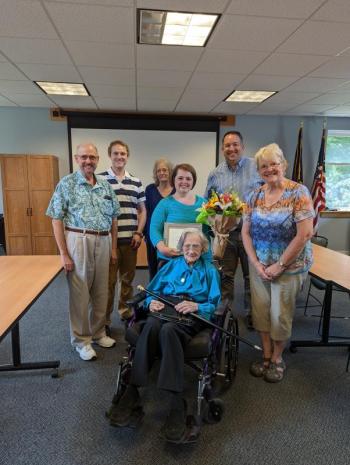Rockport honors Doris Johnson with Boston Post Cane
 Doris C. Johnson, of Rockport, received Rockport’s Boston Post Cane July 26 at the Rockport Town Office. Surrounding her are Daughter Claire and her husband, Dean Orwig; their son Karl Orwig; and Rockport Town Clerk Linda Greenlaw, Select Board Chair Michelle Hannan and Rockport Town Manager Jon Duke. Seasons Downeast, of Rockport, donated flowers and Laugh Loud Smile Big donated cupcakes. (Photo courtesy Diane Hamilton, Rockport Executive Assistant)
Doris C. Johnson, of Rockport, received Rockport’s Boston Post Cane July 26 at the Rockport Town Office. Surrounding her are Daughter Claire and her husband, Dean Orwig; their son Karl Orwig; and Rockport Town Clerk Linda Greenlaw, Select Board Chair Michelle Hannan and Rockport Town Manager Jon Duke. Seasons Downeast, of Rockport, donated flowers and Laugh Loud Smile Big donated cupcakes. (Photo courtesy Diane Hamilton, Rockport Executive Assistant)



 Doris C. Johnson, of Rockport, received Rockport’s Boston Post Cane July 26 at the Rockport Town Office. Surrounding her are Daughter Claire and her husband, Dean Orwig; their son Karl Orwig; and Rockport Town Clerk Linda Greenlaw, Select Board Chair Michelle Hannan and Rockport Town Manager Jon Duke. Seasons Downeast, of Rockport, donated flowers and Laugh Loud Smile Big donated cupcakes. (Photo courtesy Diane Hamilton, Rockport Executive Assistant)
Doris C. Johnson, of Rockport, received Rockport’s Boston Post Cane July 26 at the Rockport Town Office. Surrounding her are Daughter Claire and her husband, Dean Orwig; their son Karl Orwig; and Rockport Town Clerk Linda Greenlaw, Select Board Chair Michelle Hannan and Rockport Town Manager Jon Duke. Seasons Downeast, of Rockport, donated flowers and Laugh Loud Smile Big donated cupcakes. (Photo courtesy Diane Hamilton, Rockport Executive Assistant)



On July 28, the Town of Rockport honored longtime resident Doris C. Johnson with the Boston Post Cane, recognizing her as the elder of the town, at age 103.
Mrs, Johnson was born in Richmond Hill, Queens, N.Y., on December 30, 1918.
At 103, she has survived two pandemics. Her grandfather emigrated from Prague in Bohemia in the 1800s. She was the second daughter of Charles and Christina Tomiczek. She had one older sister, Viola. She remembered standing in the soup lines in New York City during the Great Depression.
She graduated from Richmond Hill High School, New York, in 1937. She worked as a legal secretary for a law firm for several years. She then worked as a secretary at Lake Tankers Corp in Manhattan. She later worked at the Family Service Agency in Hightstown, New Jersey.
Doris married Donald H. Johnson in 1947 and had two children in the 1950s. The family moved from Queens, N.Y., to Cranbury, N.J., in the l 960s. She spent time every summer in Maine until 1970, when she moved to her husband's family home in Rockport.
Doris' s hobbies are gardening, feeding the birds and painting. She spent many years raising orchids. She won first place one year at the juried art show at the Maine Lobster Festival with a pastoral landscape painting. Doris was also a member of the Rockport Garden Club and volunteered at Merryspring.
Doris lost her husband in 2015. She has a son, Stuart, and a daughter, Claire, two grandsons, Karl and Miles, and one great-grandson, Lincoln.
On August 2, 1909, Mr. Edwin A. Grozier, Publisher of the Boston Post, a newspaper, forwarded to the Board of Selectmen in 700 towns* (no cities included) in New England a gold-headed ebony cane with the request that it be presented with the compliments of the Boston Post to the oldest male citizen of the town, to be used by him as long as he lives (or moves from the town), and at his death handed down to the next oldest citizen of the town, according to the Boston Cane Information Center. The cane would belong to the town and not the man who received it.
In 1930 eligibility for the cane was extended to women, as well.






























